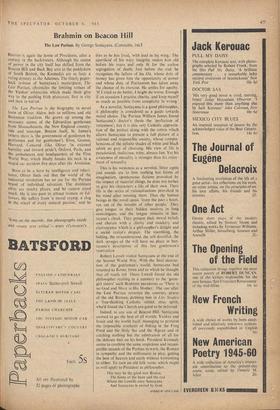Brahmin on Beacon Hill
The Last Puritan. By George Santayana. (Constable, I6s.)
BosroN is again the home of Presidents, after a century in the backwaters. Although the centre of power in the city itself has shifted from the Beacon Hill and Back Bay axis to the paddydom of South Boston, the Kennedy are as lusty a ruling dynasty as the Adamses. The timely paper- back re-issue of Santayana's masterpiece, The Last Puritan, chronicles the limiting virtues of the Yankee aristocrats which made them give Way to the pushing Irish plutocrats, first in city and then in nation
The Last Puritan is the biography in novel form of Oliver Alden, heir to millions and old Bostonian tradition. He grows up among the necessary scenes of the Edwardian gentleman from Massachusetts. the New England country- side and seascape. Boston itself, St. James's (where there is 'the government of gentlemen by gentlemen and for gentlemen'), Eton, Groton, Harvard. Concord (like Oliver 'in external humility and inward pride'), Oxford, Paris. and the ambulances and headquarters of the First World War. which finally breaks his neck in a stupid car accident live days after the Armistice.
Born to be a hero by intelligence and inheri- lance, Oliver finds out that the world of the industrial revolution has no use for the Puritan brand of individual salvation. The dominant cities are mucky places, and he cannot stand muck. He is too pure to attract women or fol- lowers. He suffers from `a moral cramp, a' clog in the w heel of every natural passion,' and he
dies as he has lived, 'with lead in his wing.' The apartheid of his wary integrity makes him old before his years 'and only fit for the useless segregation of death. Just before the end, he recognises the failure of his life, whose duty of money has given him the opportunity of power and whose duty of Puritanism has taken away the chance of its exercise. He settles for apathy. 'If I tried to do better, I might do worse. Enough if on occasion I practise charity, and keep myself as much as possible from complicity in wrong.'
As a novelist, Santayana is a good philosopher. if philosdphy is considered as a guide towards moral choice. The Puritan William James found Santayana's doctor's thesis the 'perfection of rottenness'; but it is this very Catholic apprecia- tion of the perfect along with the rotten which allows Santayana to present a full picture of a rational and responsible society, whose compre hensions.of the infinite shades of white and black admit no grey of choosing. His view of life is paradoxical; malicious, witty, always fun. Yet his awareness of morality is stronger than his enjoy- ment of sensuality This is his weakness as a novelist. Since sights and sounds are 'to him nothing but forms of imagination, spontaneous fictions provoked by the impact of material things, he does not bother to give his characters a life of their own. Their life is the, series of rationalisations provoked in his mind after meeting them. Thus the human beings in the novel speak 'from the poet s heart, not out of the mouths of other people.' They give tongue to their hidden motives in long monologues. and the tongue remains in San- tayana's cheek. They present their moral beliefs and choices with a clarity and mockery and clairvoyence which is a philosopher's delight and a social realist's despair: The stumbling, the halting, the misunderstood, the self-deceitful, the dark savages of the will have no place in San- tayana's description of this last gentleman's reservation Robert Lowell visited Santayana at the end of the Second World War. With the final destruc- tion of the gentleman's world, Santayana had returned to Rome, from and to which he thought that all roads led There Lowell found the old .philosopher reciting in a nunnery to the 'geese- girl sisters' such Brahmin paradoxes as 'There is no God and Mary is His Mother.' The one after the Last Puritan returned the contrary praise of the old Roman, dubbing him in Life Studies a 'free-thinking Catholic infidel, stray spirit. who'd found the Church too good to be believed.'
Indeed, to any son of Beacon Hill. Santayana seemed to get the best of all worlds, Yankee and Jesuit and the world itself, managing to perform the impossible synthesis of fishing in the Frog Pond and the Holy See and the "F.gean and of catching nothing but the admiration of all for the delicate bait on his hook. President Kennedy seems to combine the same suspicious and incom- patible strands of the Puritan in work, the Roman in sympathy and the millionaire in play, getting the best of heaven and earth without kowtowing to either. To turn an old folk verse, which might as well apply to President as philosopher,
This may be the good new Boston,
The home of the bean and the cod. Where the Lowells envy Santayana.
And Santayana is envied by God.
ANDREW `..:1\(I Allt














































 Previous page
Previous page